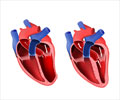Swiss scientists have developed an artificial heart muscle that could prove a boon to people suffering from atrial fibrillation, a debilitating heart rhythm disorder.
It occurs when the upper chambers of the heart are out of sync – resulting in a dangerously fast heart beat.Although not fatal, it can cause fainting, heart failure and blood clots, increasing the risk of stroke.
Common atrial fibrillation treatments include drugs, surgery, electrotherapy or a pacemaker.
The new device is a micro motorless pump (Atripump) based on artificial muscle technology positioned on the external surface of the atrium could compress the heart chamber, restoring atrium transportfunction, scientists say.
This artificial muscle pump can reproduce the mechanical effect of a normal human atrium. It is compact and reliable.
Dr Piergiorgio Tozzi, a cardiac surgeon at Vaudois University Hospital in Lausanne, Switzerland, said he developed the Atripump for patients who do not respond well to existing treatments.
Advertisement
The wires shrink when a small current passes through them, causing the dome to contract, New Scientist magazine reports.
Advertisement
Dr Tozzi said the swelling and contraction of the dome could stop the heart from beating too fast. Although several years from being tested on people, experts believe the Atripump offers hope to patients.
Around 500,000 Britons suffer from atrial fibrillation, including former Prime Minister Tony Blair.
However, the British Heart Foundation has questioned whether the device would be any more effective than a pacemaker, a device that uses electrical impulses, delivered by electrodes contacting the heart muscles, to regulate the beating of the heart.
Source-Medindia
GPL/L












